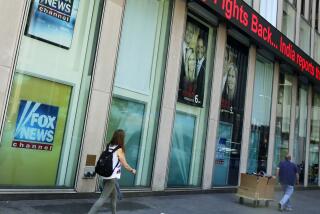2 Lewd Songs Cost KGB-FM a $25,000 Fine
- Share via
SAN DIEGO — The Federal Communications Commission is planning to fine KGB-FM (101.5) $25,000, the largest single penalty ever for indecent programming, for airing two parody songs deemed sexually explicit.
The FCC, responding to a single complainant, notified KGB on Wednesday that it is “apparently liable for a forfeiture of $25,000” for airing “The Candy Wrapper Song” once and “Sit on My Face” on two different occasions in the spring of 1990.
KGB has 30 days to appeal the notice. After that time the commission may choose to reduce the fine, but such penalties are usually upheld according to Roger Holberg, head of the FCC’s complaints department.
The fine against KGB was particularly high because other stations have been fined for playing the “The Candy Wrapper Song,” which uses candy bars as sexual metaphor. Also, that “Sit on My Face” aired twice added to the fine, Holberg said.
In responding to the FCC, KGB admitted that airing both songs was a mistake and against station policy. KGB General Manager Tom Baker didn’t return phone calls Thursday.
The songs aired during the KGB morning show between Feb. 23 and April 13, 1990, a few weeks after the morning team of Mike Berger and Jeff Prescott moved from KGB to XTRA-FM (91X) and before the current morning team of Dave Rickards and Shelly Dunn was hired.
Prescott said he and Berger had aired both songs during their tenure at KGB, but were told by KGB management not to play them anymore.
“The funny thing is, at the time we played ‘Candy Wrapper,’ gauging by the responses we got, people loved the song,” said Prescott, who recently was suspended by 91X for three days, along with partners Berger and Russ T. Nailz, for airing a barely edited Andrew Dice Clay routine.
In the last three years, the FCC has moved for the first time to crack down on programming judged to be obscene or indecent, defining indecent programming as anything that graphically depicts “sexual and excretory activity or organs” in a “patently offensive” manner, Holberg said. In the past, the FCC primarily handed down fines only for the use of foul language, stemming from the infamous “seven dirty words” case.
The largest previous fine was $20,000, imposed against KSJO in San Jose in 1990 for airing a variety of explicit routines and conversations with listeners, Holberg said. Until 1989, the maximum amount the FCC could fine a station for a violation of regulations was $2,000. But that year, Congress raised the maximum to $25,000, Holberg said. The base fine is usually $12,500 for indecency violations.
More to Read
Sign up for Essential California
The most important California stories and recommendations in your inbox every morning.
You may occasionally receive promotional content from the Los Angeles Times.








